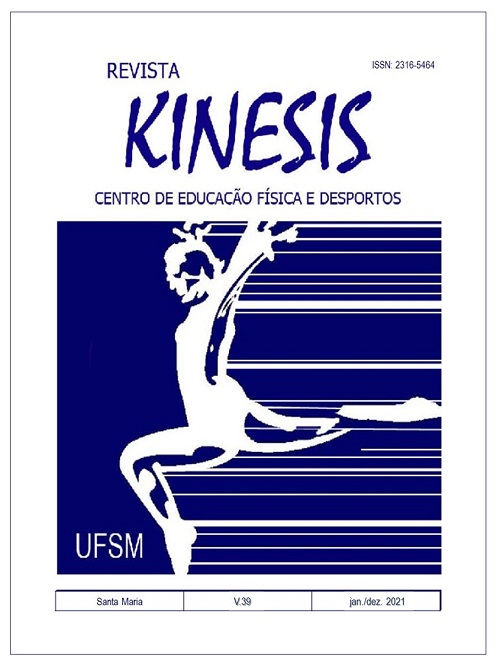On the idea of teaching the dialogical-problematizing movement: to think about "se movimentar"
DOI:
https://doi.org/10.5902/2316546464713Keywords:
Physical Education, Teaching, Dialogical-ProblematizingAbstract
The problems that permeate teaching and learning have always crossed the area of Physical Education. The idea of learning about “se movimentar” through dialogical-problematizing teaching appears, even if in part, from the act of Elenor Kunz finding in Paulo Freire important principles for (re)thinking the teaching of Physical Education at school (KUNZ, 1991). This text has as its central thesis the question about what does Elenor Kunz mean when he is referring to a teaching of dialogical-problematizing movement? And it aims to answer, above all, what this movement teaching conception proposes. Therefore, it is a theoretical investigation, which consists of (re)building concepts, theories and ideas, seeking to expand the discussions. Along this path, the Dutch and German tradition of human movement is recovered (Sich bewegen). Finally, it resumes the idea of teaching the dialogical-problematizing movement, in the sense of continuing to think about the challenges surrounding teaching and learning in the contemporary.
Downloads
References
FRANKFURTER ARBEITSGRUPPE (HRSG.). Offener Sportunterricht – Analy-Sieren Und Planen. Reinbek, 1982.
FREIRE, Paulo. Educação como prática de liberdade. Rio de Janeiro: Paz e Terra, 1967.
______________. Pedagogia do Oprimido. 14. ed. Rio de Janeiro: Paz e Terra, 1985.
______________. Pedagogia da autonomia: saberes necessários à prática educativa. São Paulo: Paz e Terra, 1996.
FOUCAULT, Michel. Vigiar e Punir: nascimento da prisão; tradução de Raquel Ramalhete. 42. ed. Petrópolis, RJ: Vozes, 2014.
HEIJ, Peter. Begründungen eine Verantwortungs Bewegungsunterricht. Budel, Nederland: Damon, 2006.
(Tradução do holandês para o alemão por Andreas H. Trebels em 2009, e do alemão para o português por Elenor Kunz em 2014).
HILDEBRANDT-STRAMANN, Reiner. Ação dialógica na Educação Física: considerações educacionais teóricas e pedagógicas de movimento. Motrivivência, [S.L.], v. 32, n. 63, p. 01-16, 5 ago. 2020. Universidade Federal de Santa Catarina (UFSC). http://dx.doi.org/10.5007/2175-8042.2020e72870.
KUNZ, Elenor. O esporte como conteúdo hegemônico da Educação Física escolar. Ijuí: Contexto & Educação, 1989.
_____________. Educação Física: ensino & mudanças. Ijuí: Unijuí, 1991. [Coleção Educação Física, 3 ed. 2012].
_____________. Transformação didático-pedagógica do esporte. Ijuí: Unijuí, 1994. [Coleção Educação Física, 8 ed. 2014].
____________. Por uma concepção teórico-filosófica do Movimento Humano. In: anais. V Colóquio de pesquisa qualitativa em Motricidade Humana: Motricidade, Educação e Experiência, 5. 2012, São Carlos, p.59-67.
SOARES, Carmen Lúcia et al. Metodologia do ensino de Educação Física. São Paulo: Cortez, 1992.
TREBELS, Andreas Heinrich. Plaidoyer para um diálogo entre teorias do movimento humano e teorias do movimento no esporte. Rev. Bras. Ciên. Esp., Campinas, v. 13, n. 3, p. 338-344, maio, 1992.
_______________________.Uma concepção dialógica e uma teoria do movimento humano. Perspectiva. v. 21, n. 1, p. 249-267, jan. /jun. 2003.
________________________. A concepção dialógica do movimento humano: uma teoria do “se-movimentar”. In: KUNZ, E.; TREBELS, A. H. (Org.). Educação física crítico emancipatória: com uma perspectiva da pedagogia alemã do esporte. Ijuí: Ed. Unijuí, 2006.
TAMBOER, Jan W. I. Movimentar-se: um diálogo entre o homem e o mundo. Revista Pedagógica do Esporte, Hamburgo, v. 3, n. 2, p. 14-29, março 1979. [Tradução do Grupo de Trabalho Pedagógico UFSM/UFPE, 1986]. [Sich-bewegen: ein Dialog zwischen Mensch und Welt in: Sportpädagogik].
Downloads
Published
How to Cite
Issue
Section
License
The works must be submitted in the digital format of the SEER platform, via the electronic address: http://periodicos.ufsm.br/kinesis/index. In case of any doubts, contact the editorial team through the email kinesisrevista@ufsm.br. The authorship that publishes in the Kinesis journal agrees to the following terms:
- They retain copyright and grant the journal the right of first publication.
- They allow and are encouraged to publish and disseminate their work online (e.g., in institutional repositories or on their personal page) as this can cause positive alterations, as well as increase the impact and quotation of the published work.







